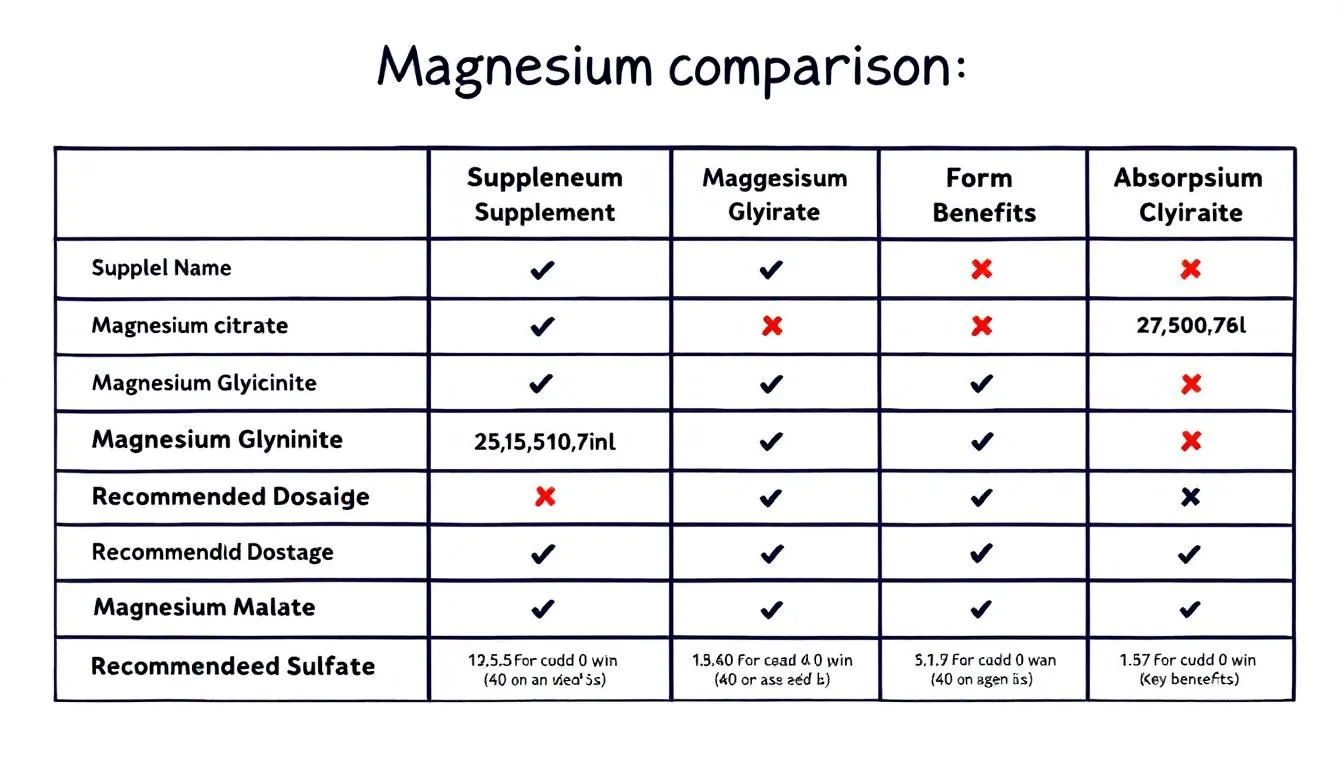Why Magnesium Lactate Outperforms Other Magnesium Supplements

When it comes to magnesium supplements, not all forms are created equal. Magnesium lactate stands out as one of the most easily absorbed and well-tolerated options available, making it an excellent choice for those seeking to address magnesium deficiency or support overall health. This comprehensive guide will walk you through everything you need to know about this vital mineral supplement, from its unique benefits to proper dosage and safety considerations.

What is Magnesium Lactate?
Magnesium lactate is a mineral supplement formed when magnesium binds with lactic acid, creating a highly bioavailable compound that your body can readily absorb and utilize. This unique combination classifies it as an electrolyte supplement essential for numerous body functions, from muscle contraction to nervous system health.
The primary use of this supplement is treating and preventing magnesium deficiency, a condition that affects millions of people worldwide. Unlike other forms of magnesium that can cause digestive discomfort, magnesium lactate plays a vital role in supporting heart health, nervous system function, and digestive system wellness without the harsh side effects commonly associated with alternative formulations.
Magnesium is involved in over 300 enzymatic reactions throughout the body, making adequate intake crucial for good health. This mineral supplement provides approximately 12% elemental magnesium by weight, meaning that every gram contains roughly 120 mg of usable magnesium for your body’s needs.
Health Benefits and Medical Uses
The health benefits of magnesium lactate extend far beyond simple deficiency prevention. This mineral supplement excels at treating magnesium deficiency and maintaining healthy magnesium levels, which is crucial since many people don’t get enough magnesium from their diet alone.
Muscle function and bone health represent two primary areas where magnesium lactate provides substantial benefits. The mineral participates directly in muscle contraction and relaxation processes, making it invaluable for athletes and individuals experiencing muscle weakness or cramping. Additionally, magnesium works synergistically with calcium and vitamin D to support strong bones throughout life.
Heart and cardiovascular system support constitute another major benefit area. Magnesium helps regulate blood pressure, supports normal heart rhythm, and contributes to overall cardiovascular health. Many healthcare providers recommend magnesium supplementation as part of a comprehensive approach to heart health maintenance.
The nervous system relies heavily on adequate magnesium for proper function. This mineral supports cellular energy production, helps regulate neurotransmitter function, and may play a role in migraine prevention and headache management. Some studies suggest that maintaining optimal magnesium levels can help reduce the frequency and severity of headaches in susceptible individuals.
How Magnesium Lactate Works in the Body
Understanding how magnesium lactate works reveals why it’s often preferred over other forms like magnesium oxide or magnesium citrate. The lactate portion of the compound enhances absorption significantly compared to inorganic magnesium salts, allowing your body to utilize more of the supplement you take.
This enhanced absorption translates to being gentler on your digestive system. While other forms of magnesium can cause severe upset stomach, diarrhea, or cramping, magnesium lactate typically produces fewer gastrointestinal side effects. This makes it an excellent choice for individuals with sensitive stomachs or those who have experienced problems with other magnesium supplements.
Once absorbed, magnesium participates in over 300 metabolic reactions throughout your body. It plays crucial roles in muscle contraction, blood pressure regulation, and protein synthesis. The mineral also supports the production of energy at the cellular level, helping convert food into usable energy for daily activities.
The bioavailability advantage of magnesium lactate means you can achieve therapeutic magnesium levels with smaller doses compared to less absorbable forms. This efficiency reduces the pill burden while maximizing the benefits you receive from each dose.

Proper Dosage and Administration
Proper dosage of magnesium lactate depends on several factors, including your individual needs, current magnesium levels, and the specific product you’re using. For most adults, the typical dosing involves taking 1-2 tablets every 12 hours with food. This spacing helps maintain steady magnesium levels while reducing the risk of digestive upset.
Standard Process recommendations suggest taking one tablet per meal, which provides consistent supplementation throughout the day while tying intake to your natural eating schedule. Taking magnesium lactate with food is crucial - it significantly reduces the likelihood of upset stomach while improving overall absorption.
When taking extended release tablets, it’s essential to swallow them whole without crushing, chewing, or breaking them. Damaging the extended release coating can lead to rapid release of the entire dose, potentially causing stomach acid irritation and reducing the supplement’s effectiveness.
If you experience a missed dose, take it as soon as you remember, provided it’s not close to your next scheduled dose. Never double up on doses to make up for a missed one, as this can increase the risk of side effects and may overwhelm your body’s absorption capacity.
The timing of your doses can impact absorption and tolerability. Many people find that taking their supplement with breakfast and dinner works well, providing morning and evening coverage while ensuring food is present to aid absorption.
Side Effects and Safety Considerations
While magnesium lactate is generally well-tolerated, understanding potential side effects helps you use it safely and effectively. Common side effects include diarrhea, bloating, gas, and mild upset stomach, though these occur less frequently than with other magnesium forms.
Signs of allergic reactions require immediate emergency medical attention and may include difficulty breathing, swelling of the face or throat, severe rash, or trouble breathing. If you experience any of these symptoms, contact a poison control center or seek medical help immediately.
Overdose symptoms can occur with excessive intake and may include confusion, dizziness, muscle weakness, irregular heartbeat, or severe diarrhea. High doses of any magnesium supplement can overwhelm your body’s ability to regulate magnesium levels, leading to potentially serious complications.
Special precautions apply to individuals with kidney disease. Since the kidneys play a crucial role in magnesium regulation, those with compromised kidney function should consult their doctor before starting any magnesium supplement. The reduced ability to eliminate excess magnesium can lead to dangerous accumulation.
Safety considerations for pregnant and breastfeeding women emphasize the importance of medical supervision. While magnesium is essential during pregnancy and lactation, the appropriate dosage and form should be determined by a healthcare provider familiar with your specific situation.

Drug Interactions and Precautions
Magnesium lactate can interact with various prescription and over-the-counter medications, making it crucial to inform your healthcare providers about all current medications and supplements you’re taking. Some interactions can affect drug absorption, while others may enhance or reduce therapeutic effects.
Certain antibiotics, particularly tetracyclines and fluoroquinolones, can have reduced absorption when taken with magnesium supplements. To minimize this interaction, space these medications at least 2-4 hours apart from your magnesium dose, and always follow your doctor or pharmacist’s specific timing recommendations.
Many other drugs may interact with magnesium supplements, including some heart medications, diuretics, and bone-building medications. The mineral can affect how these drugs work in your body, either by changing absorption rates or by influencing the same physiological pathways.
Avoiding concurrent use of other magnesium-containing supplements without medical supervision prevents accidental overdose. Many products contain magnesium, including antacids, laxatives, and multivitamins. Reading labels carefully and maintaining a list of all supplements helps prevent unintentional duplication.
The drug prevents certain absorption issues when properly spaced from conflicting medications. Your pharmacist can provide specific guidance on timing your doses to maximize effectiveness while minimizing interaction risks.
What to Avoid While Taking Magnesium Lactate
Certain foods and substances can interfere with magnesium absorption or increase the risk of side effects. High-fat foods consumed simultaneously with your supplement can reduce magnesium absorption, though taking it with a balanced meal that includes moderate amounts of healthy fats typically doesn’t pose problems.
Avoiding other magnesium supplements without medical supervision prevents potential overdose situations. Since magnesium is found in many over-the-counter products, accidentally combining multiple sources can lead to excessive intake and unwanted side effects.
Alcohol dependence and regular alcohol consumption can affect magnesium levels in complex ways. Alcohol can increase magnesium excretion through the kidneys while also affecting absorption. If you have concerns about alcohol use and magnesium supplementation, discuss this with your healthcare provider.
Optimal timing with other medications requires careful planning. Some supplements and medications work better when taken together, while others should be separated by several hours. Creating a medication schedule with your pharmacist’s help ensures you get the most benefit from all your treatments.
Stomach acid levels can influence magnesium absorption, so avoiding antacids immediately before or after taking your supplement helps maintain optimal absorption conditions. If you regularly use antacids, discuss timing strategies with your healthcare provider.
Comparison with Other Magnesium Forms
When compared to magnesium oxide, magnesium lactate demonstrates superior absorption characteristics. Magnesium oxide, while containing a high percentage of elemental magnesium, has poor bioavailability - only about 4% is typically absorbed. This means you need much larger doses to achieve therapeutic effects, and the unabsorbed magnesium often causes digestive upset.
Magnesium citrate offers good bioavailability but tends to have more pronounced laxative effects than magnesium lactate. While this can be beneficial for individuals with constipation, it may be problematic for those seeking magnesium supplementation without digestive side effects.
The gentler digestive tolerance of magnesium lactate makes it suitable for high-dose supplementation needs. Individuals requiring substantial magnesium intake for therapeutic purposes often find they can tolerate higher doses of lactate form compared to other forms of magnesium.
Magnesium chloride provides excellent absorption but often has a bitter, unpleasant taste that makes it less suitable for long-term supplementation. Magnesium lactate’s neutral taste profile makes it more acceptable for daily use.
Less laxative effect compared to magnesium sulfate represents another significant advantage. While magnesium sulfate (Epsom salt) is sometimes used therapeutically for its laxative properties, magnesium lactate provides magnesium supplementation without unwanted bowel effects in most people.

Who Should Consider Magnesium Lactate
Individuals with diagnosed magnesium deficiency represent the primary group who should consider magnesium lactate supplementation. Blood tests can reveal low magnesium levels, and symptoms might include muscle cramps, fatigue, weakness, or irregular heart rhythms.
People with digestive sensitivity who have experienced problems with other magnesium supplements often find magnesium lactate more tolerable. Those who have experienced severe upset stomach, cramping, or diarrhea with other forms may benefit from switching to this gentler option.
Individuals needing high-dose magnesium supplementation for therapeutic purposes often prefer magnesium lactate because they can achieve higher intake levels without experiencing gastrointestinal distress. This includes people with certain medical conditions that increase magnesium requirements.
Patients seeking sustained-release magnesium options benefit from extended release formulations of magnesium lactate. These products provide steady magnesium levels throughout the day, which can be particularly beneficial for individuals with conditions requiring consistent magnesium support.
Athletes and physically active individuals may benefit from magnesium lactate supplementation, especially if their diet doesn’t include adequate amounts from foods like green leafy vegetables and whole grain cereals. The mineral’s role in muscle function and energy production makes it valuable for active lifestyles.
Storage and Handling Instructions
Proper storage of magnesium lactate ensures product potency and safety throughout its shelf life. Room temperature storage between 59-86°F (15-30°C) provides optimal conditions for maintaining supplement integrity. Avoid storing supplements in bathrooms, kitchens, or other areas where temperature and humidity fluctuate significantly.
Protection from moisture, heat, and direct light prevents degradation of the active ingredients. Store your supplements in their original containers with tight-fitting lids, and consider using a dry place like a bedroom closet rather than areas exposed to cooking heat or bathroom steam.
Child-safety considerations require storing all supplements in locations inaccessible to children. Even though magnesium lactate is generally safe, accidental ingestion by children can lead to serious complications. Use child-resistant caps when available and store products on high shelves or in locked cabinets.
Expiration date monitoring ensures you’re taking effective supplements. Check dates regularly and dispose of expired products properly. Most pharmacies and community centers offer medication disposal programs that safely handle expired supplements and medications.
Never store supplements in vehicles, garages, or other areas subject to extreme temperatures. Heat can accelerate breakdown of active ingredients, while freezing temperatures may affect tablet integrity and dissolution properties.

Conclusion
Magnesium lactate represents an excellent choice for individuals seeking effective magnesium supplementation with minimal digestive side effects. Its superior absorption compared to other forms like magnesium oxide, combined with its gentle nature, makes it suitable for both short-term deficiency treatment and long-term health support.
Whether you’re addressing diagnosed magnesium deficiency, supporting muscle and bone health, or maintaining optimal nervous system function, magnesium lactate offers a well-tolerated solution. The availability of extended release formulations provides additional flexibility for those requiring sustained magnesium levels throughout the day.
Remember that while magnesium lactate is available without a prescription, it’s always wise to consult your doctor or pharmacist before starting any new supplement regimen. They can help determine if magnesium lactate is appropriate for your specific health condition and can provide guidance on proper dosing and potential interactions with other medications you may be taking.
The key to successful supplementation lies in consistent use, proper timing with food, and regular monitoring of your response to treatment. With proper use, magnesium lactate can play a valuable role in supporting your overall health and helping you maintain optimal magnesium levels for years to come.




Leave a comment